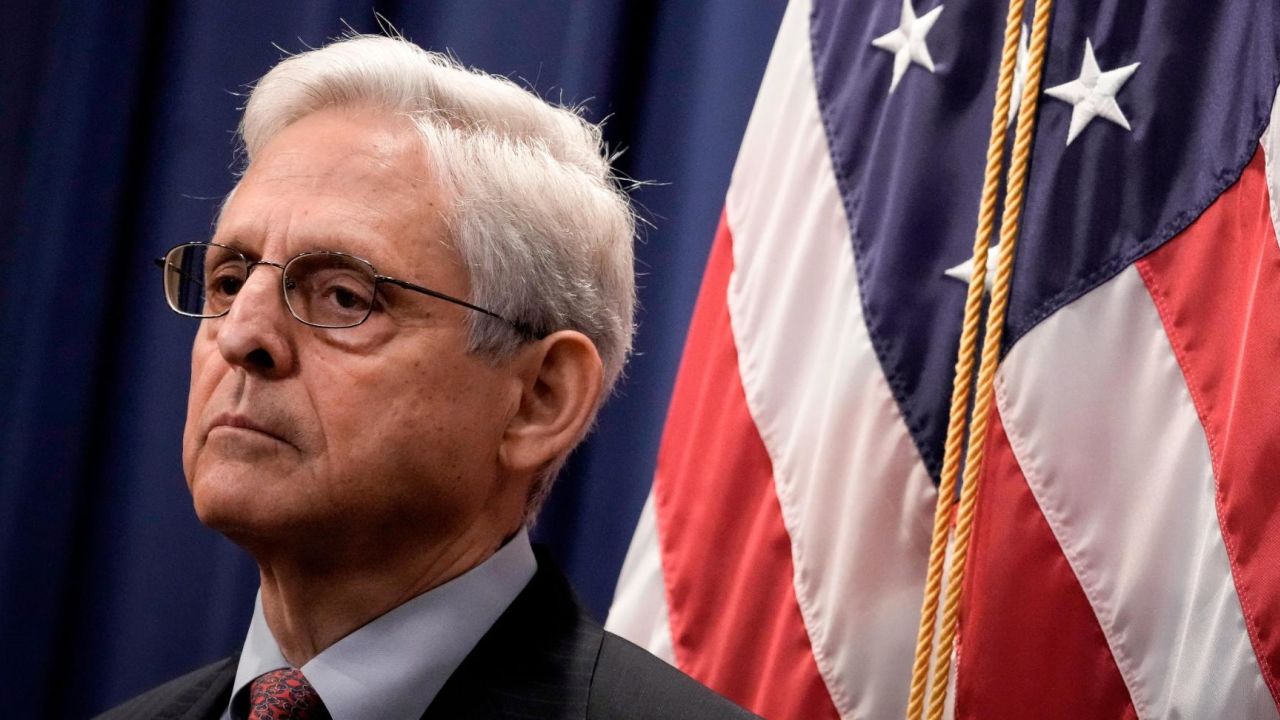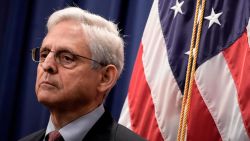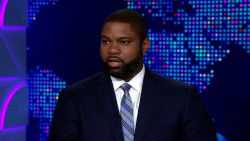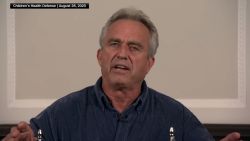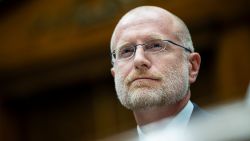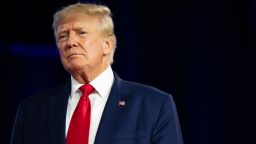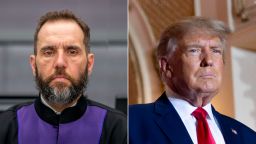Jack Smith, the special counsel announced by Attorney General Merrick Garland on Friday to oversee the criminal investigations into the retention of classified documents at former President Donald Trump’s Mar-a-Lago resort and parts of the January 6, 2021, insurrection, is a long-time prosecutor who has overseen a variety of high-profile cases during a career that spans decades.
Smith’s experience ranges from prosecuting a sitting US senator to bringing cases against gang members who were ultimately convicted of murdering New York City police officers. In recent years, Smith has prosecuted war crimes at The Hague. His career in multiple parts of the Justice Department, as well as in international courts, has allowed him to keep a relatively low-profile in the oftentimes brassy legal industry.
His experience and resume will allow him, at least at first, to fly underneath the type of political blowback that quickly met former special counsel Robert Mueller’s team. It also shows he is adept at managing complex criminal cases related to both public corruption and national security – and that he has practice making challenging decisions with political implications.
Smith is widely expected to be tasked with making policy decisions around whether to charge a former president of the United States. Garland’s statements on Friday and the recent steps taken in the Mar-a-Lago and January 6 investigations have signaled that, at the very least, Donald Trump is under investigation and could potentially be charged with a crime.
“He knows how to do high-profile cases. He’s independent. He will not be influenced by anybody,” said Greg Andres, a former member of Mueller’s team.
Andres, who has known Smith since the late 1990s when they started at a US attorney’s office together and ultimately became co-chiefs of the office’s criminal division, said it’s the breadth of Smith’s experience that will enable him to withstand the public scrutiny and make tough judgment calls.
“He will evaluate the evidence and understand what type of case should be charged or not. He has the type of experience to make those judgments,” said Andres.
“He understands the courtroom. He understands how to try a case. He knows how to prove a case,” he added. “Particularly in these circumstances it will be critical to understand what types of evidence is required to prove the case in court.”
In a statement following his announcement, Smith pledged to conduct the investigations “independently and in the best traditions of the Department of Justice.”
“The pace of the investigations will not pause or flag under my watch. I will exercise independent judgment and will move the investigations forward expeditiously and thoroughly to whatever outcome the facts and the law dictate,” Smith said.
One former colleague highlighted that Smith has prosecuted members of both parties.
“He’s going to be really aggressive,” the person said, adding that “things are going to speed up.” Smith, they said, “operates very quickly” and has a unique ability to quickly determine the things that are important to a case and doesn’t waste time “hand-wringing over things that are real sideshows.”
In court, Smith comes off as very down-to-earth and relatable, this person said, characterizing that as a good attribute to have as a prosecutor.
Smith also will not care about the politics surrounding the case, they said, adding he has very thick skin and will “do what he’s going to do.”
A career prosecutor
Smith began his career as an assistant district attorney with the New York County District Attorney’s Office in 1994. He worked in the Eastern District of New York in 1999 as an assistant US attorney, where he prosecuted cases including civil rights violations and police officers murdered by gangs, according to the Justice Department.
As a prosecutor in Brooklyn, New York, one of Smith’s biggest and most high-profile cases was prosecuting gang member Ronell Wilson for the murder of two New York City police department detectives during an undercover gun operation in Staten Island.
Wilson was convicted and sentenced to death, the first death penalty case in New York at the time in 50 years, though a judge later found he was ineligible for the death penalty.
Moe Fodeman, who worked with Smith at EDNY, called him “one of the best trial lawyers I have ever seen.”
“He is a phenomenal investigator; he leaves no stone unturned. He drills down to get to the true facts,” Fodeman said.
Fodeman, who is still friends with Smith, said he is a “literally insane” cyclist and triathlete.
Beginning in 2008, Smith worked for the International Criminal Court and oversaw war crimes investigations under the Office of the Prosecutor for two years.
In 2010, he became chief of the Public Integrity Section of the Justice Department, where he oversaw litigation of public corruption cases. Lanny Breuer, the former assistant attorney general for the DOJ’s Criminal Division who recruited Smith, said his onetime employee was “a terrific prosecutor” with a “real sense of fairness.”
“If you are going to have a special counsel, in my view, and you want someone who is going to be fearless, but fair, and not going to be intimidated and not overly bureaucratic, that’s Jack – he is all of these things,” Breuer told CNN.
“Smith brings cases quickly. … He doesn’t sit on cases. He is a person of action,” Breuer added.
After his stint at the Public Integrity Section, Smith was appointed first assistant US attorney for the Middle District of Tennessee in 2015.
Though he is not widely known in Washington, DC, legal circles, Smith is described as a consummate public servant.
About a decade ago, he hired waves of line prosecutors into the Public Integrity Section of the Justice Department, supervising dozens over his years in charge there.
Brian Kidd, whom Smith hired at the unit, recalled how his boss walked him through every step of a complicated racketeering case against corrupt police officers.
“He was not going to tolerate a politically motivated prosecution,” Kidd said. “And he has an incredible ability to motivate the people working with him and under him. He’s incredibly supportive of his team.”
Smith handled some of the most high-profile political corruption cases in recent memory – to mixed outcomes.
He was the head of the public integrity unit when then-Virginia Gov. Bob McDonnell was indicted in 2014, and was in meetings with the defense team and involved in decision-making leading up to the charges, according to a person familiar with the case.
McDonnell was initially convicted of receiving gifts for political favors, but then his conviction was overturned by the Supreme Court.
Smith was also at the helm of the unit when the DOJ failed to convict at trial former Senator and vice presidential candidate John Edwards.
A Republican source familiar with Smith’s oversight of the investigation into former House Majority Leader Tom DeLay commended Smith’s non-biased approach, saying that he ultimately made a “just” decision to conclude the investigation without alleging DeLay committed any crime.
In recent years while working at The Hague, he has not lived in the United States. He’s no longer on the US Triathlon team but is still a competitive biker.
Smith took over as acting US Attorney when David Rivera departed in early 2017 before leaving the Justice Department later that year and becoming vice president of litigation for the Hospital Corporation of America. In 2018, he became chief prosecutor for the special court in The Hague, where he investigated war crimes in Kosovo.
“Throughout his career, Jack Smith has built a reputation as an impartial and determined prosecutor, who leads teams with energy and focus to follow the facts wherever they lead,” Garland said during the announcement on Friday. “Mr. Smith is the right choice to complete these matters in an even-handed and urgent manner.”
Smith interviewed as part of Republican-led IRS probe
In May 2014, the House Oversight Committee interviewed Smith behind closed doors as part of the Republican-led investigation into the alleged IRS targeting of conservative groups. Then-Oversight Chairman Darrell Issa launched the probe following a 2013 inspector general report that found delays in the processing of applications by certain conservative groups and requesting information from them that was later deemed unnecessary.
Republicans sought testimony from Smith, who at the time was Public Integrity section chief, due to his involvement with arranging a 2010 meeting between Justice Department officials and then-IRS official Lois Lerner, the official at the center of the IRS scandal. The meeting had been convened to discuss the “evolving legal landscape” of campaign finance law following the Citizens United Supreme Court decision, according to a May 2014 letter written by Issa and Rep. Jim Jordan, the Ohio Republican who is expected to be House Judiciary chairman next year.
“It is apparent that the Department’s leadership, including Public Integrity Section Chief Jack Smith, was closely involved in engaging with the IRS in wake of Citizens United and political pressure from prominent Democrats to address perceived problems with the decision,” Issa and Jordan wrote in the letter seeking Smith’s testimony.
Smith testified that his office “had a dialogue” with the FBI about opening investigations related to politically active non-profits following the meeting with Lerner, but did not ultimately do so, according to a copy of his interview obtained by CNN.
Smith explained that he had asked for the meeting with the IRS because he wanted to learn more about the legal landscape of political non-profits following the Citizens United decision because he was relatively new to the public integrity section. He said that Lerner explained it would be difficult if not impossible to bring a case on the abuse of tax-exempt status.
Smith repeated at several points in the interview that the Justice Department did not pursue any investigations due to politics.
“I want to be clear – it would be more about looking at the issue, looking at whether it made sense to open investigations,” he said. “If we did, you know, how would you go about doing this? Is there predication, a basis to open an investigation? Things like that. I can’t say as I sit here now specifically, you know, the back-and-forth of that discussion. I can just tell you that – because I know one of your concerns is that organizations were targeted. And I can tell you that we, Public Integrity, did not open any investigations as a result of those discussions and that we certainly, as you know, have not brought any cases as a result of that.”
Smith also testified that he was not aware of anyone at the Justice Department placing pressure on the IRS – and that he was never pressured to investigate any political groups.
“No. And maybe I can stop you guys. I know there’s a series of these questions. I’ve never been asked these things, and anybody who knows me would never even consider asking me to do such a thing,” Smith said.
This story has been updated with additional details.
CNN’s Jessica Schneider, Tierney Sneed and Paula Reid contributed to this report.





